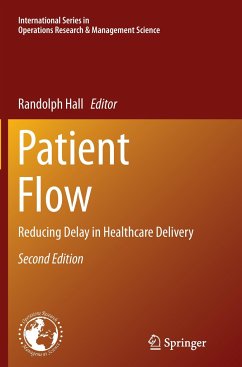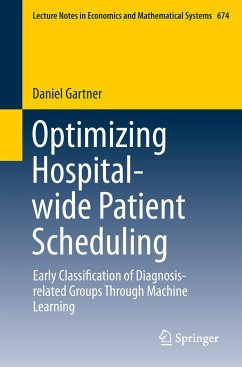
Handbook of Healthcare System Scheduling
Versandkostenfrei!
Versandfertig in 6-10 Tagen
113,99 €
inkl. MwSt.

PAYBACK Punkte
57 °P sammeln!
This edited volume captures and communicates the best thinking on how to improve healthcare by improving the delivery of services -- providing care when and where it is needed most -- through application of state-of-the-art scheduling systems. Over 12 chapters, the authors cover aspects of setting appointments, allocating healthcare resources, and planning to ensure that capacity matches needs for care.A central theme of the book is increasing healthcare efficiency so that both the cost of care is reduced and more patients have access to care. This can be accomplished through reduction of idle...
This edited volume captures and communicates the best thinking on how to improve healthcare by improving the delivery of services -- providing care when and where it is needed most -- through application of state-of-the-art scheduling systems. Over 12 chapters, the authors cover aspects of setting appointments, allocating healthcare resources, and planning to ensure that capacity matches needs for care.
A central theme of the book is increasing healthcare efficiency so that both the cost of care is reduced and more patients have access to care. This can be accomplished through reduction of idle time, lessening the time needed to provide services and matching resources to the needs where they can have the greatest possible impact on health. Within their chapters, authors address:
(1) Use of scheduling to improve healthcare efficiency.
(2) Objectives, constraints and mathematical formulations.
(3) Key methods and techniques for creating schedules.
(4) Recent developments that improve the available problem solving methods.
(5) Actual applications, demonstrating how the methods can be used.
(6) Future directions in which the field of research is heading.
Collectively, the chapters provide a comprehensive state-of-the-art review of models and methods for scheduling the delivery of patient care for all parts of the healthcare system.
Chapter topics include setting appointments for ambulatory care and outpatient procedures, surgical scheduling, nurse scheduling, bed management and allocation, medical supply logistics and routing and scheduling for home healthcare.
A central theme of the book is increasing healthcare efficiency so that both the cost of care is reduced and more patients have access to care. This can be accomplished through reduction of idle time, lessening the time needed to provide services and matching resources to the needs where they can have the greatest possible impact on health. Within their chapters, authors address:
(1) Use of scheduling to improve healthcare efficiency.
(2) Objectives, constraints and mathematical formulations.
(3) Key methods and techniques for creating schedules.
(4) Recent developments that improve the available problem solving methods.
(5) Actual applications, demonstrating how the methods can be used.
(6) Future directions in which the field of research is heading.
Collectively, the chapters provide a comprehensive state-of-the-art review of models and methods for scheduling the delivery of patient care for all parts of the healthcare system.
Chapter topics include setting appointments for ambulatory care and outpatient procedures, surgical scheduling, nurse scheduling, bed management and allocation, medical supply logistics and routing and scheduling for home healthcare.














